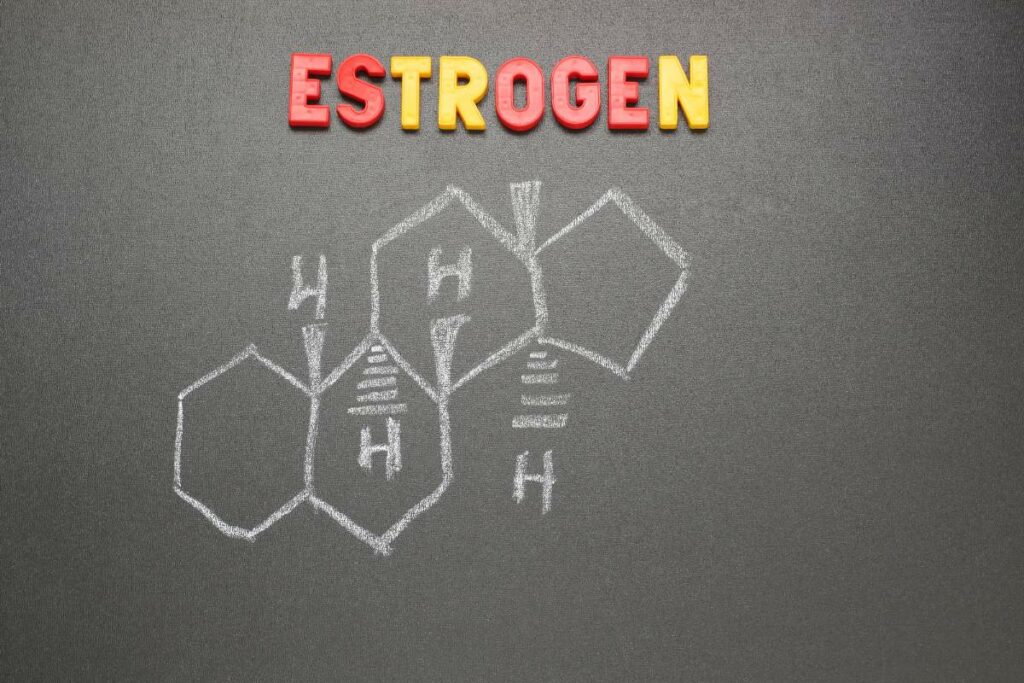Understanding Women’s Metabolism: The Key to Effective Weight Loss
Have you ever wondered why that fitness regimen or diet plan that worked wonders for your friend didn’t quite have the same effect on you?
The answer lies not in the number of crunches you do or salads you eat but rather, in the complex world of hormones and how they control your metabolism.
Let’s dive into this fascinating topic of women’s metabolism, shall we?

This post may contain affiliate links, which helps keep this content free. Please read our disclosure for more info.
Hormones: The Hidden Puppet Masters
Hormones, these magical little messengers running in our blood, play a significant role in controlling our metabolism.
They’re like the conductors of our body’s symphony, coordinating everything from growth and mood to appetite and energy usage.
Hormones like insulin, cortisol, leptin, ghrelin, and especially sex hormones like estrogen, have profound effects on our metabolism and weight.
The Mighty Estrogen

It’s high time we got to know one of the most influential players in the female hormonal lineup: estrogen.
This powerhouse hormone, often associated with femininity and reproduction, wields considerable influence over our bodies – extending its reach into areas as diverse as bone health, cardiovascular function, mood regulation, and yes, our metabolism.
During our fertile years, estrogen is our ally in maintaining a healthy weight.
One of its key roles is enhancing insulin sensitivity. In plain English, it makes our body’s cells more receptive to insulin, a hormone that helps convert the glucose in our bloodstream into a form of energy that our cells can use.
This efficient energy use not only fuels our day-to-day activities but also prevents excess glucose from being stored as fat.
Moreover, estrogen also plays a role in controlling our appetite and food intake.
Studies have shown that estrogen can affect the brain regions controlling energy intake and expenditure, helping us feel full and satisfied.
In this way, estrogen contributes to maintaining our energy balance, keeping our metabolism humming along harmoniously.
However, the scenario starts to shift as we enter menopause.

The curtains begin to close on our reproductive years, and our bodies gradually decrease the production of estrogen. This hormonal downshift can have profound metabolic consequences.
As estrogen levels dip, so does insulin sensitivity. This means our bodies are not as efficient at processing sugars, leading to higher levels of glucose in our blood.
The decline in estrogen also impacts our body’s ability to control food intake, leading to increased appetite and potential weight gain.
Decreased estrogen levels can also lead to changes in fat distribution. Even if your weight stays stable, you might notice a shift in where your body tends to store fat.
Many women experience an increase in abdominal fat during menopause, a change that can be attributed to declining estrogen levels.
The journey through menopause might seem like a metabolic roller coaster, but fear not. By understanding how estrogen impacts metabolism, we can tailor our lifestyle choices to work with these hormonal changes, not against them.
Whether it’s through diet, exercise, stress management, or medical interventions, we can support our bodies through this transition, keeping that metabolic flame burning bright.
A Delicate Balance: The Thyroid Hormone and Cortisol
While estrogen may be the leading lady in the world of women’s metabolism, the supporting actors – thyroid hormone and cortisol – play critical roles that deserve our attention as well.
The Thyroid: Your Personal Metabolic Thermostat

The thyroid gland, a small, butterfly-shaped organ located at the base of your neck, is a true metabolic maestro.
It produces two key hormones, triiodothyronine (T3) and thyroxine (T4), which govern a broad range of metabolic functions.
Thyroid hormones help control the rate at which our bodies break down food and convert it into energy.
They influence everything from our heart rate to how quickly we burn calories, even while resting. In essence, these hormones dictate the pace at which our metabolic engine runs.
However, like all finely tuned instruments, the thyroid requires balance. Too much thyroid hormone production can lead to hyperthyroidism, a condition where metabolism speeds up.
While this might sound ideal for weight loss, the reality is far from it. It can cause rapid or irregular heartbeat, anxiety, irritability, and unexpected weight loss.
On the flip side, insufficient thyroid hormone production results in hypothyroidism, characterized by a slow metabolism. This can lead to fatigue, depression, sensitivity to cold, and yes, weight gain.
Recognizing these symptoms and seeking timely medical advice can ensure your thyroid – and consequently, your metabolism – remains in perfect harmony.
Cortisol: The Stress Response Maestro

Next in the lineup is cortisol, often dubbed the ‘stress hormone.’
Produced by the adrenal glands, cortisol is vital in helping us respond to stressful situations. It provides a quick energy boost, enhances memory function, and helps with pain tolerance.
However, the beneficial ‘fight or flight’ response becomes detrimental when stress is chronic.
Long-term stress keeps cortisol levels perpetually elevated, and this overexposure can disrupt various bodily functions, including metabolism.
Elevated cortisol levels influence weight by interfering with insulin, leading to imbalanced blood sugar and increased cravings for sugary, fatty foods.
Excess cortisol promotes fat storage, particularly in the abdominal area, due to its effect on appetite, insulin regulation, and fat distribution.
Remember, maintaining hormonal balance is critical to a healthy metabolism.
Understanding the role and interaction of the thyroid hormone and cortisol in your body allows you to make more informed choices about your lifestyle, stress management, and nutrition.
The symphony of your body’s functions need not be a mystery, and with a little insight and balance, you can keep it playing harmoniously.
The Dynamic Duo: Leptin and Ghrelin

Let’s take a moment to discuss two of the most pivotal players in our metabolic orchestra, the dynamic duo of appetite regulation – leptin and ghrelin.
Often referred to as the ‘hunger hormones,’ these two form a fascinating pair that significantly influences our energy balance and body weight.
Leptin: The Satiety Superstar
Leptin, primarily produced by your body’s fat cells, is often referred to as the ‘satiety hormone.’ Its role is akin to a diligent traffic cop, signaling your brain to put the brakes on eating once you’ve had enough.
As your fat stores increase, your leptin levels rise, sending a signal to your brain that you have plenty of energy reserves.
This signal should suppress appetite and help you eat less. Conversely, if fat stores decrease, so do leptin levels, informing the brain that it’s time to refuel, thereby boosting appetite.
However, for those with obesity, there’s a twist.
Despite high levels of leptin, the brain seems to become ‘leptin resistant’ and doesn’t respond to the satiety signals as effectively. This condition can lead to continued overeating despite sufficient or excessive fat stores.
Ghrelin: The Hunger Hero
Ghrelin, on the other hand, is known as the ‘hunger hormone.’
It’s like the ‘go’ signal in a race, stimulating your appetite and essentially prompting you to eat. Ghrelin is primarily produced in the stomach and levels rise before meals when you’re hungry and decrease after meals when you’re full.
Interestingly, ghrelin also plays a role in determining how much of the energy you consume gets stored as fat.
So, not only does it influence your hunger levels, but it also has a say in how your body manages the energy it receives.
The Delicate Dance
When the delicate balance between leptin and ghrelin gets disrupted, it can lead to weight gain and metabolic issues.
Chronic sleep deprivation, stress, or a diet high in sugars and refined carbohydrates are factors that can tilt the scales, leading to an increase in ghrelin levels or a decrease in leptin sensitivity.
Understanding the interplay of these hormones can help you manage your hunger better and make smarter decisions about when and what to eat.
Navigating the Hormonal Highway and Women’s Metabolism
Our bodies are complex, intricate systems, governed by a web of hormones that act as internal compasses, guiding our metabolic pathways.
Understanding this hormonal interplay is the first step in unlocking a more efficient metabolism.
However, knowledge is power only when it’s applied. So, let’s talk about some strategies for harmonizing with our hormones and steering our metabolism towards better health and effective weight loss.
Nutritious Nourishment

A balanced, wholesome diet is like high-quality fuel for your body.
Foods rich in fiber, protein, and healthy fats can work wonders for your hormonal balance.
Dietary fiber helps regulate insulin response by slowing sugar absorption in the bloodstream, preventing those dreaded sugar spikes and crashes.
Meanwhile, protein and healthy fats can help control your hunger hormones. They tend to be more satiating, keeping you fuller for longer, and can help keep leptin and ghrelin in a harmonious balance.
The Power of Movement
Regular physical activity isn’t just great for your heart and mood; it’s a boon for your metabolism too.
Exercise aids in increasing metabolic rate, burning more calories, and regulating insulin levels.
Plus, it can help modulate stress hormones and even improve your sleep quality – which brings us to our next point.
Slumber for Stability

Never underestimate the power of a good night’s sleep.
Lack of sleep can throw a monkey wrench into your hormonal machinery, increasing ghrelin (the hunger hormone) and cortisol (the stress hormone), while decreasing leptin (the satiety hormone).
The result? Increased appetite, cravings, and a slower metabolism.
Stress Less
Chronic stress can spike cortisol levels, leading to an imbalanced blood sugar, increased appetite, and belly fat accumulation.
Incorporating stress-management practices like yoga, meditation, or simple breathing exercises can go a long way in keeping cortisol in check.
Listening to Your Body
Finally, remember that our bodies are as unique as our personalities. Hormonal levels can vary greatly among women, and what works for one might not work for another.
It’s vital to tune in, listen to your body’s cues, and if needed, seek medical advice for managing hormonal imbalances.
There’s no one-size-fits-all approach to metabolism and weight loss.
Embracing our understanding of women’s metabolism and the intricate hormonal symphony playing inside us allows us to work harmoniously with our bodies, rather than against them.
Need Help Boosting Your Metabolism to Lose Weight?
Are you struggling to lose weight effectively? Understanding the intricate workings of the human body can be the key to unlocking successful weight loss.
That’s where our 21-Day Fat Loss Challenge comes in. This program is designed to help kickstart your weight loss journey, offering a comprehensive guide on diet, exercise, and lifestyle changes that work.

It’s about setting you up with the knowledge, skills, and habits that will not only help you lose fat but also maintain your results in the long run.
The 21-Day Fat Loss Challenge is more than just a program; it’s a community.
Along with expert advice and resources, you’ll also be joining a supportive network of women who are all on the same journey. Remember, there’s strength in numbers, and together we can make sustainable weight loss a reality.
So, are you ready to embrace a healthier lifestyle? Are you ready to empower yourself with the knowledge, strategies, and support to achieve sustainable weight loss?
If the answer is yes, then we’re ready to welcome you! Join the 21-Day Fat Loss Challenge today, and let’s embark on this incredible journey together.

